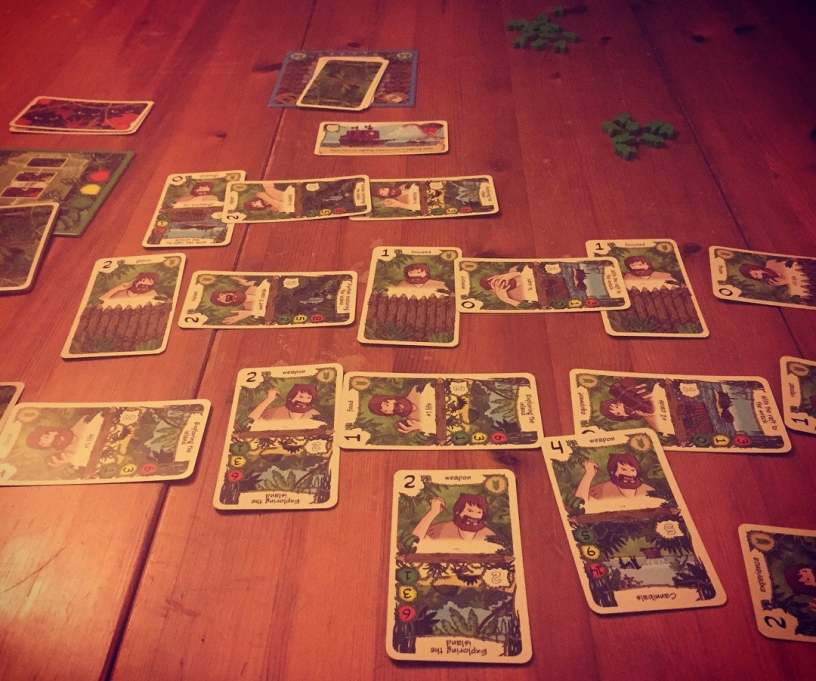Type: Deck Management / Push Your Luck
Time to play: < 30 minutes (Teaching: 10 minutes)
Best played with: 1 player (Solo Only)
Sometimes its difficult to get a game group together or perhaps you are just on the go but want to get a short game in…what to do? what to do? Well why not play a solo game? Beyond the games that happen to play a solo mode, there are now games with specifically designed solo rules and indeed a few games which are only designed to be played solo. One of these such games is Friday by Friedman Friese.
This is a solo adventure where you take the role of Friday – the mysterious man on the island that befriends Robinson Crusoe. You are the plucky native that helps Robinson learn how to survive. It’s a game about helping Robinson train so that you can reach an epic fight against the pirates which might just let Robinson escape. Of course, you will stay on your island at the end and somehow he will get shipwrecked there all over again soon!
The game takes this little narrative through 4 key stages utilising deck management and push your luck to give you a real agency to the game. The first three stages you draw through the island deck with a traffic light system – green first, yellow next, red (and very dangerous) last. Survive all that and you face the pirates. Each card plays in a similar way – you will need to know how tough the opponent is (on that level of green/yellow/red) and you will get a certain number of “free” cards. If at any point your cards match the difficulty, you defeat the island card & gain it – with the pirates the victory is all that matters. If you do need more cards to win then pay 1 health for each one you want to draw. If you do lose, pay the difference between your strength and the strength of the card in health.
What makes this really interesting is two fold. Firstly, you get a choice of two cards every time from the island deck. You can dodge the “too difficult” cards or dodge the “easy but worthless” cards and it’s important to balance this decision carefully. Take too many easy wins in the early game and your deck will be full of useless cards in the late game, leaving you paying away previous life points to draw more cards. Take too many difficult cards, and you won’t survive the green round. After all, think about the fact your initial deck has an expected value of
So you made your choice, and you drew some cards. Now if your still losing to the card you have a decision again – pay for more, or lose and use this opportunity to “trash” the weakest cards from those you drew. This is really interesting, because sometimes you are better off losing and getting rid of those bad cards from your deck, especially the negative points cards. A small deck with a higher expected value sounds great, time to trash everything! Oh wait; every time the deck rounds out I get a REALLY negative card?! Yes, that’s the aging process in this game, the more turns of the deck and the more negative cards that get thrown in.
So you can trash cards, you can select which cards you might add to the deck and you can use the cards special abilities (text on each card) to manipulate the deck – this then is certainly not just a push your luck game. The rewarding thing about all this is that you also feel the puzzle is not just “solved” when you first win. This is a careful balancing act that you can optimise and improve every time you come back to the game. What is more, there are four suggested difficulty levels in the game – something akin to a player’s experience of going all the way to Legendary difficulty on Halo!
Of course, the downside of this game is that it’s for one. Don’t get me wrong, you can get people involved in a “co-op” appraoch, but there’s only one character and only one decision really to be made. Also, this is a game which whilst small and portable, is somewhat delicate. Small pieces and thin cards mean that you still need to be careful where you set up. Lastly, it’s worth pointing out that the pirates at the end feel relatively straight forward; it’s likely that if you make it through the three stages you will beat the pirates. It’s not certain, but this end game boss doesn’t add much to either the theme or the mechanics of the game.
All that said, I didn’t think I would get in to solo playing and yet by far this game is my preferred route in this and I play it often. It’s got a phone app format if you want to try it, but there is something more tactile and interesting about this game than Onirim or other good app conversions. Also, if you are playing solo versions of multiplayer games then I would really encourage that this is a great step up on what can feel like a mechanical points optimising challenge in other games.
Last notes:
- If you like games with deck management, but can’t always get the group together then this is a great solo choice
- If you hate re-sorting the decks between games to be able to reset quickly… perhaps keep looking
- If you win at this game – well done, time to up the difficulty!
